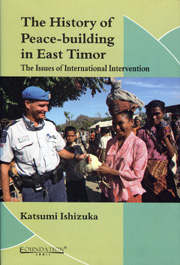Book contents
- Frontmatter
- Contents
- Preface
- Acknowledgements
- Acronyms
- Introduction
- Section 1 Historical Background
- Section 2 Policy Analysis
- Section 3 Comparative Analysis
- Chapter VIII A Comparative Analysis on UN Peace-building: East Timor and Cambodia
- Chapter IX The Impact of Peace-building Efforts on the Justice System of East Timor: the UN (Western) versus Traditional Cultures
- Conclusion
- Bibliography
- Index
Chapter IX - The Impact of Peace-building Efforts on the Justice System of East Timor: the UN (Western) versus Traditional Cultures
from Section 3 - Comparative Analysis
Published online by Cambridge University Press: 26 October 2011
- Frontmatter
- Contents
- Preface
- Acknowledgements
- Acronyms
- Introduction
- Section 1 Historical Background
- Section 2 Policy Analysis
- Section 3 Comparative Analysis
- Chapter VIII A Comparative Analysis on UN Peace-building: East Timor and Cambodia
- Chapter IX The Impact of Peace-building Efforts on the Justice System of East Timor: the UN (Western) versus Traditional Cultures
- Conclusion
- Bibliography
- Index
Summary
Introduction: Significance of this Research
At the present time, attention has been paid to the term ‘soft power’ in the field of international relations, especially since the advent of the book Soft Power by Joseph Nye in 2004. He put emphasis on the need of states to adopt the concept of soft power in order to exert their power effectively. It is interesting that Nye introduced peacekeeping or peacemaking as one instance of soft power. Nye described Norway's role as a peacemaker by taking the initiative in peace talks in civil and international disputes, thus enhancing Norway's soft power and elevating its value to larger states. He also stated that one of the sources that soft power of a country rests on is its culture. The UN achieves peacemaking and peacekeeping missions by recruiting military and civilian staff from most of its member states. The UN is not a state, so the ideology of Nye's book is not applicable to it; but it exerts a significant power in achieving international peace and security. In this sense, the UN has legitimacy in paying attention to the concept of soft power in its activities including peace operations.
Has the UN valued the concept of culture in its peace operations? In several interviews with the UN staff, many of them answered that the UN inevitably prioritises universal values which are historically rooted in the Western society.
- Type
- Chapter
- Information
- The History of Peace-Building in East TimorThe Issues of International Intervention, pp. 225 - 249Publisher: Foundation BooksPrint publication year: 2010

